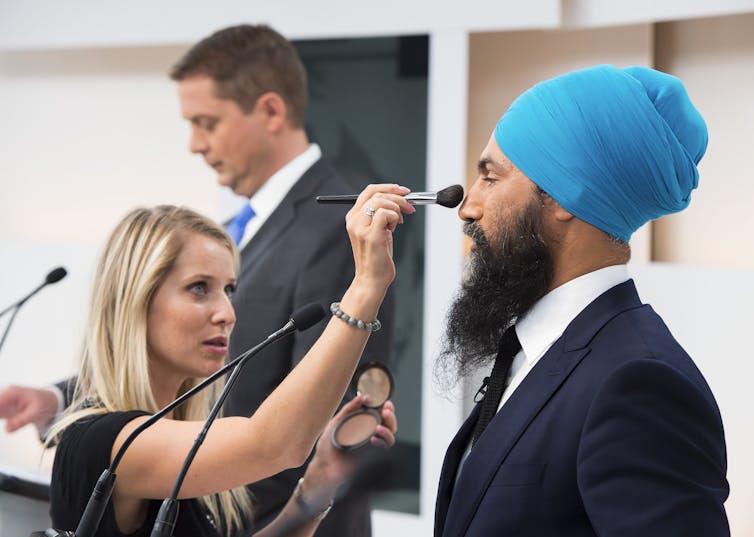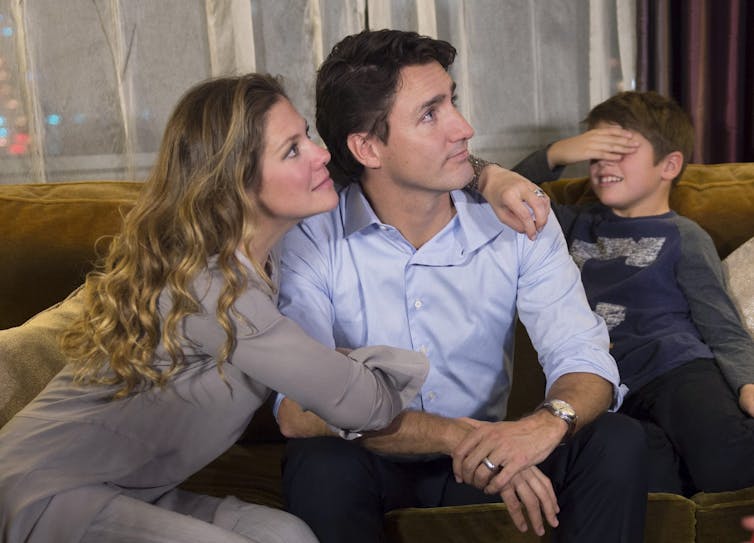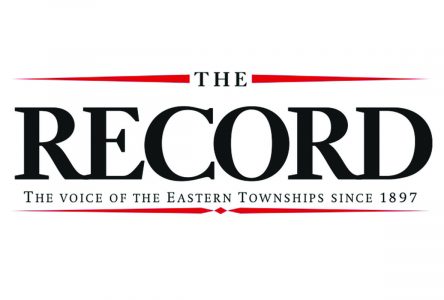
THE CANADIAN PRESS/Frank Gunn
Lawrence LeDuc, University of Toronto; Harold D Clarke, University of Texas at Dallas; Jane Jenson, Université de Montréal, and Jon H. Pammett, Carleton University
Canada’s federal election is now in full swing.
Over the past several months, the Liberals and the Conservatives have been running neck-and-neck in public opinion polls that show the two larger parties in a statistical tie, each with approximately 34 per cent of the vote.
Based on aggregated polling data, seat projections using these numbers suggest either a very narrow Liberal majority or possibly a minority government.
Negative campaigning is already gearing up, and surveys show substantial public discontent with the political process. Big issues like climate change and the state of the economy are slowly emerging as the central focus of the campaign.
Read more:
Canadians in every riding support climate action, new research shows
The party leaders are trying to showcase their strengths in dealing with these high-profile issues and to raise doubts about the capabilities of their opponents.
The leader debates, scheduled for Oct. 7 (English) and Oct. 10 (French), will reinforce this focus on the leaders.
Does this context suggest that Canadian electoral politics is on a new or unfamiliar path? Not really, as we discuss in our new book, Absent Mandate: Strategies and Choices in Canadian Elections.
Despite the political and economic changes that have taken place over the past two decades, there is considerable continuity with past federal elections. This includes a widespread feeling that political parties cannot be trusted to offer real choices among policy alternatives.
Reliance on market forces
Indeed, since the mid-1990s, all of the parties have accepted the broad outlines of a neoliberal policy agenda involving increasing reliance on market forces and retrenchment of the welfare state.
Read more:
What exactly is neoliberalism?
Parties frame policy discussions around issues that have broad agreement, and focus their campaigns on the party leaders, promising better performance rather than policy alternatives. The parties have learned that their electoral coalitions are fragile and require constant renewal.
In turn, voters have learned that elections are a convenient way to express their discontent, with few consequences for future policy directions. Election campaigns, building on digital technologies and social media, channel voters’ negative feelings, and attack ads are now a staple of electioneering strategies.
Issue agendas are limited to vague performance goals such as “growing the economy” or “protecting the environment.” These issues reflect widespread public consensus, and political debate focuses on “how to do the job” and, most importantly, “who is most capable” of doing it.
The strengths and weaknesses of the party leaders are put front and centre.

THE CANADIAN PRESS/Paul Chiasson
Party advertising already suggests that campaign rhetoric will focus on the party leaders and performance issues in 2019. One of the earliest Conservative ads was a version of the unsuccessful “Just Not Ready” ad directed at Justin Trudeau in 2015.
A second Conservative ad presents Andrew Scheer promising to “lower the cost of living” and “leave money in your pocket.” A Liberal ad with the slogan “Choose Forward” seems as vacuous as the infamous “The Land is Strong” theme of Pierre Trudeau’s disastrous 1972 campaign.
Flexible party loyalty
Our analysis in Absent Mandate shows that federal elections can be highly unpredictable. Nonetheless, we can anticipate some things.
Many Canadians have flexible partisan attachments and move easily from one party to another. Coupled with widespread public discontent, this lack of durable ties to parties encourages voters to switch their vote or move into or out of the active electorate.
Read more:
How to encourage the occasional voter to cast a ballot
In each of the last two federal elections, there was considerable movement in the polls over the last few weeks of the campaign. This is a distinct possibility again. We also expect to see parties concentrating on popular issues like the government’s economic performance and environmental protection.
And, as always, the parties will claim that their leader has “what it takes” to markedly improve the lives of Canadians, while trying to portray opposition leaders as not up to the job.
Negativity turns off voters
Negativity in the parties’ campaigns may depress turnout the way it has in federal and provincial elections for some time. Participation in federal elections has decreased over the past three decades, partly reflecting generational changes, as young people declined to vote in numbers comparable to their elders.
Although turnout rebounded in 2015, the demographic factors driving the decline in participation are likely to re-emerge in 2019. Millennials in particular are likely to be a key voting group.
Given these entrenched characteristics of Canadian electoral politics, we can predict that the 2019 election is unlikely to deal in any meaningful way with concrete solutions to the important problems of our times.
And that discontent with the next government will resume, whether the outcome is a majority or a minority.
[ Like what you’ve read? Want more? Sign up for The Conversation’s daily newsletter. ]![]()
Lawrence LeDuc, Professor Emeritus of Political Science, University of Toronto; Harold D Clarke, Ashbel Smith Professor, University of Texas at Dallas; Jane Jenson, Professeure émérite, political science, Université de Montréal, and Jon H. Pammett, Distinguished Research Professor, Political Science, Carleton University
This article is republished from The Conversation under a Creative Commons license. Read the original article.




